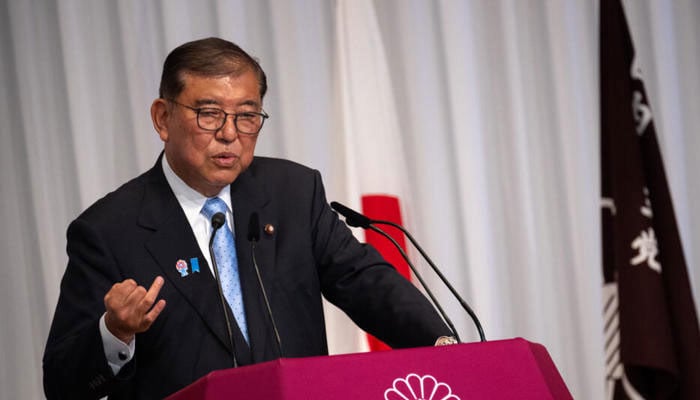Select Language:
- Japan’s PM Ishiba remains in position despite election losses.
- Sanseito party gains traction with nationalist, anti-globalist stance.
- “Diplomacy is currently under strain.”
Despite experiencing what he described as an “extremely regrettable” election outcome, Japanese Prime Minister Shigeru Ishiba announced on Monday that he would continue in office as the specter of increased US tariffs looms.
In the election held Sunday, Ishiba’s Liberal Democratic Party (LDP), which has maintained power for nearly all of the years since 1955, and its coalition partner Komeito fell short by three seats of securing a majority in the upper house.
Frustrated by rising inflation, voters shifted their support to other parties, particularly the Sanseito, which made notable gains by promoting an “anti-globalist” agenda reminiscent of populist movements in other countries.
“I believe (the LDP) should have faced greater losses,” remarked 25-year-old Kazuyo Nanasawa, who cast her vote for a minor ultra-conservative party, emphasizing that Ishiba should resign.
This setback comes just months after Ishiba’s coalition was compelled to form a minority government in the more influential lower house, marking the LDP’s worst performance in 15 years.
When asked late Sunday if he planned to stay in his position, Ishiba confirmed to local media, “Yes, that’s correct.”
“Changes in the external environment, such as international circumstances or natural disasters, cannot wait for the political landscape to improve,” Ishiba stated during a Monday press conference.
“For this reason, while I fully acknowledge the serious implications of our election results, I believe I must fulfill my responsibilities as the party with the most votes and to the citizens of this country, while carefully listening to the concerns of local communities,” he added.
It remains uncertain who would be poised to succeed Ishiba, given that the government will require opposition support in both chambers to enact legislation.
LDP supporter Takeshi Nemoto, 80, remarked to AFP that initiating a new leadership contest “would be a losing battle” for the party, complicating tariff discussions with US President Donald Trump’s administration.
“Diplomacy is facing challenges right now,” echoed 67-year-old Shuhei Aono. “Who is going to manage it? I think (Ishiba) can’t just step back easily.”
‘Japanese First’
The election involved 125 of the 248 upper house seats.
The coalition needed to win 50 but reportedly secured only 47, with the LDP claiming 39 and Komeito capturing eight, leaving them with 122 representatives.
The second-largest share went to the Constitutional Democratic Party of Japan (CDP), which secured 22 seats, followed by the Democratic Party for the People (DPP) with 17.
The right-wing Sanseito party succeeded in obtaining 14 seats.
Sanseito advocates for “stricter regulations on immigration,” opposes “radical” gender policies, and seeks a reevaluation of decarbonization and vaccination efforts.
Last week, the party was compelled to deny any affiliation with Moscow—known for its support of populist parties globally—following an interview granted by one of their candidates to Russian state media.
Political analysts assert that the opposition remains fragmented, and it’s unlikely that the parties will unite to form an alternative government, according to Hidehiro Yamamoto, a politics and sociology professor at the University of Tsukuba.
Expanding the coalition would be challenging, with the DPP seen as the most probable ally “contingent on the government delivering some favorable fiscal measures, like tax reductions,” he noted.
More likely, Ishiba will continue to require opposition assistance on a case-by-case basis to push through legislation.
Trump Tariffs
After experiencing stagnant or declining prices for years, consumers in the world’s fourth-largest economy have faced inflation pressures since Russia’s invasion of Ukraine in 2022.
Specifically, rice prices have surged, significantly burdening household budgets, despite government assistance.
Adding to the strain is a lingering outrage stemming from an LDP funding scandal and looming 25% tariffs that could take effect on August 1 unless a trade agreement is reached.
Japanese imports already face a 10% levy, while the automotive sector, which represents 8% of jobs, is grappling with a 25% tariff.
On Monday, tariffs envoy Ryosei Akazawa embarked on his eighth trip to Washington.
“We are committed to securing an agreement beneficial for both Japan and the US based on investment rather than tariffs,” declared Ishiba.






